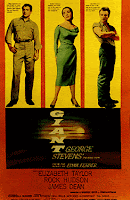Giant
 Giant (1956) is an epic drama that spans three generations of the Benedict family as members of their close-knit Texan community become oil-rich. The film focuses mainly on Jordan “Bick” Benedict Junior, his struggle to maintain a ranching legacy in his family against the dynamic personalities of its members and his life-long contention with ranch-hand turned millionaire Jett Rink. However, there is also a sub-plot that portrays racism against Mexican-Americans by white Texans, a situation which improves incrementally with every new generation.
Giant (1956) is an epic drama that spans three generations of the Benedict family as members of their close-knit Texan community become oil-rich. The film focuses mainly on Jordan “Bick” Benedict Junior, his struggle to maintain a ranching legacy in his family against the dynamic personalities of its members and his life-long contention with ranch-hand turned millionaire Jett Rink. However, there is also a sub-plot that portrays racism against Mexican-Americans by white Texans, a situation which improves incrementally with every new generation.Bick (played by Rock Hudson) is a Texan rancher who meets socialite Leslie (played by Elizabeth Taylor) when he travels to Maryland to buy her stallion. He is enamored with her, though shocked by her frank and intelligent remarks, and they quickly marry. When the couple leave lush Maryland for dusty Texas, it is clear that Leslie is in a much tougher and cruder world. She must get used to new codes of behavior, most notably in the greater docility expected of her gender and unsympathetic attitude towards Mexicans. Mexicans form the Benedict household and ranch staff but Bick quickly stops Leslie from thanking them or inquiring their names, stating curtly: “Here we don’t make a fuss over those people.” Leslie also meets Bick’s formidable sister Luz and their oddball ranch-hand Jett (played by James Dean), who clearly irks Bick but Luz keeps him at the ranch out of compassion.
Leslie is resolutely dealing with the hardships of married life on a Texas ranch when their home-life is shaken up by Luz’s death. In her will, Luz bestows to Jett a plot of land. Jett lacks direction in life and gives the impression of being simple-minded, but he is astute enough to honour the will instead of taking the $1200 that Bick offers him in lieu of the land, wanting to keep the family ranch intact. The Benedicts have twins, Jordan III and Judy, who temporarily ease their marital strife. However, Bick finds the family structure that the male Benedicts upheld for generations unraveling when Leslie sidesteps his authority to improve the living conditions of the Mexican household and ranch staff, and his young son is terrified by horse-riding. This initiates a sense of failure in him which compounds throughout the film.
To intensify Bick’s resentment, Jett strikes big while prospecting for oil. Bick watches helplessly as trucks drive across his cattle ranch, but even he must concede to building wells with an increased demand for petroleum during WWII. After this point, the film transitions its focus from the couple to their struggle to accept the life choices of their young adult children. Jordan III balks the tradition that he take over the ranch, electing instead to become a doctor and controversially marry a Mexican girl named Juana. Judy and her fiancée also reject ownership of the ranch, favouring to start up their own homestead. Luz Junior, born some years after the twins, has a schoolgirl crush on Jett. Meanwhile, Jett has skyrocketed into fame and fortune, but it proves more than he can handle. The Benedicts travel to one of Jett’s hotels where Texan elites have gathered to see him deliver a national radio address. Jett drinks himself to oblivion, brawls with Jordan III who is incensed about racist policies in the hotel, and publicly passes out on a banquet table. On the way back home, an embittered Bick is redeemed when he fist-fights a diner owner who refuses service to a Mexican family, finally becoming a hero to Leslie. The film closes as they muse about the success and transformation of their family line while watching over their grandchildren, with the camera panning in on two pairs of blue and brown eyes, signaling the hopefulness of the next generation.
Giant (1956) has three interlacing stories: the growth and change of the Benedict family, the rise and fall of oil baron Jett Rink, and the physical and symbolic integration of Mexicans into the United States. As we learn from Jett, generations ago the Benedict family bought their 590,000 acres “from some ignorant Mexicans” at a meager 5¢ per acre. Now, the Mexicans are living in squalid conditions working for an Anglo-American, and targeted by vicious racism. At the beginning, Bick has zero interest in the Mexicans and is exasperated when Leslie enlists Dr. Guerro to review their living conditions, stating: “I’m not the Red Cross, I’m a cow man.” However, one of these racial “others” who he only conceived of as labourers enters his family as a daughter, which causes him to extend his sphere of personal responsibility even to the unknown Mexican family in the diner. By the end of the film, his son shares a practice with the Mexican doctor, and there is a beloved mixed-race child amongst his grandchildren. Mexicans are also portrayed as symbolically becoming part of the United States via their participation in WWII. The first person from the ranch to enlist is Angel Obregón Jr. who dies in action abroad. His funeral is a moving scene in which his flag-draped coffin is surrounded by the Mexican community, and then approached by Bick who solemnly presents Angel Obregón Sr. with the Texas flag. This flag, which to him was previously a symbol of whiteness, is now the property of both cultures.
